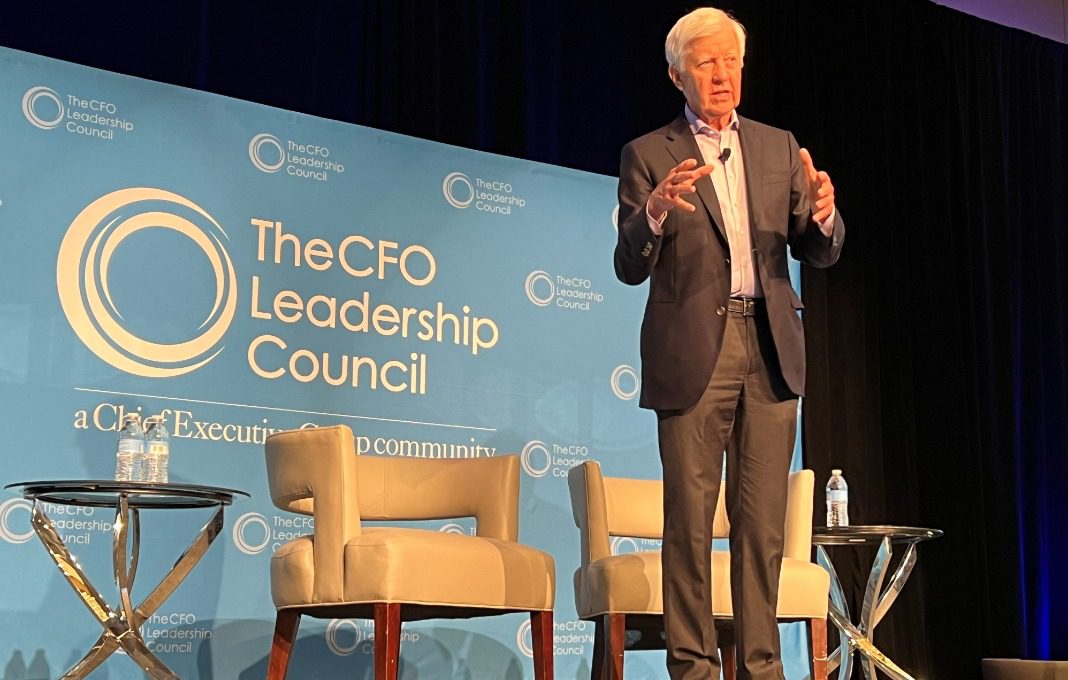It’s as difficult a time for business—and CFOs—as there has ever been. The volatile economy, the pulls from your team inside the company, the pulls from outside. And always the numbers.
How do you handle it all? At The CFO Leadership Council’s annual Leadership Conference in Boston, former Medtronic CEO Bill George told the audience that the tougher things get, the more critical it is that you find your true north, that purpose for all you do, that helps you through the tough times and helps give meaning to your work, and guides your interactions with everyone—both inside and outside the company.
“You have to know who you are,” he said. “You can’t lead today till you know who you are. If you just go out and start and start leading, you’ll run into difficult times….Look, we can’t solve all the difficult problems in the world, but you can make a difference to make this world a better place for the people around you, the people closest in and the work your company does. Because at the end of the day, leadership is character….it’s built upon a moral compass. That’s your true north.”
One of the most respected CEOs of the last 25 years, George is now an executive fellow teaching leadership at Harvard Business School and is the author of Discover Your True North: Becoming an Authentic Leader and True North: Emerging Leader Edition. He shared a number of leadership tips he learned along the way:
- Get real…with yourself. “Ask yourself, am I an authentic leader? You said you were. Am I sincere, genuine and real? But the key is what happens under pressure? Do my behaviors change? Do I still act authentically or do I revert back to a different style? Because if you keep clear about your true north, your true north is really who you are. It’s the things in your life that give you satisfaction, fulfillment, where you’re highly motivated by your work. Are you motivated by your work? And you stay true to your values? And that leads to I think, a deep level of satisfaction.”
- Build EQ. “I’ve studied over a hundred leaders who have failed. You don’t have to be the smartest person. You can surround yourself [with] people that are smarter than you are. But they failed because they lacked emotional intelligence, EQ, if you will. They had the IQ, they didn’t have the EQ, they didn’t really know who they were or they’re, when a crisis came, they’re unable to face reality and admit they’ve made mistakes that led to that crisis.”
- Find that North Star. “Think about your own life. What are the crucial goals? What’s the difficult times you’ve had? What’s that wake-up call? You may have had to make a difference. And so you really feel your life is something that makes a difference in the lives of other people. It’s so much more than chasing numbers. Go back to your organization. Are you clear about your company’s purpose? Does it have what we call the North Star that’s your North Star, that fixed point in the sky? My personal North Star is, I’ve never been the expert at anything. So my personal North Star is to enable you to reach your full potential.”
He also offered some pragmatic operational tips for CFOs in working with their CEOs based on is decades of work in C-Suites, among them:
- Stick with facts. “You’re just being straightforward,” he said. “You’re saying, ‘here are the things, here are the options we have, here’s what we can do. Let’s look at that.’ That’s why you have to be that partner. You have to build that trust. You don’t wait until there’s a crisis. You have to build the trust with your CEO. They need that. If you can’t, any CEO that can’t trust his or her CFO, it’s not going to end well. Okay. You’ve got to build that trust.”
- Bring options. “Maybe you have a really powerful boss that only wants good news. Well, you’re going to have to be the one who says, ‘sorry, I gotta tell you, it’s just not good news.’ But I think you always have an option. You don’t just come in and say it’s bad news. No, ‘here’s what we can do. Here are the options, here are the things.’ Always have some options. I would say that’s really important.”
- Build trust. With your CEO, with the team, with everyone around you. “The hardest thing you have to do is to see yourself as others see you, how you’re coming across. Do people have fear of you or do they have an openness? Go off, do one-on-ones, take ’em out for lunch. You know, just go for a long walk. I do that a lot. Walk around the lake and talk to people and say, how you doing?”
One final tip he offered: don’t become a prisoner of your calendar. That’s how you lose control not only of your schedule, but to spend the time on the things that matter an enormous amount in a business—customers, colleagues, ideas, thinking—things that have deadlines, so they tend to get pushed aside.
“Other than your boss, don’t let people put things on your calendar,” said George. “You don’t know what’s coming. ‘Is this meeting really important? Do we need to meet or not? Can we just talk it over?’ Maybe we just have a phone call. ‘How about if I call you up and we’ll talk about it? I’ll walk over to your desk and let’s see if we can settle this rather than having a big formal meeting.’ I think there are way too many formal meetings and not nearly enough attention to what’s going on.
“Don’t get trapped in your office. We found the average meeting was an hour and 15 minutes. Why not have half-an-hour meetings? Why not have stand up five, 10-minute meetings? You find out you learn a lot more from that. At least I did. I got a lot of information that way. And I had people that go to people I could pick up a phone and call and say, ‘Hey, how things are going? How’s it coming along?’ And they’ll tell you.”








